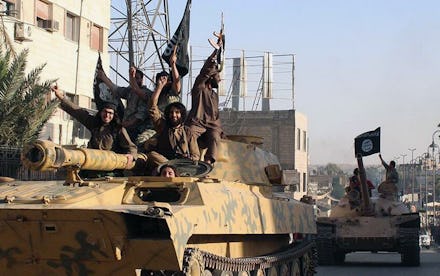The Pentagon Is Just Getting Started With the Islamic State

If the Islamic State wasn't already at the forefront of policymakers' minds during its violent sweep across parts of Iraq, its execution of American journalist James Foley this week surely made it foreign policy priority number one.
No one makes that clearer than Pentagon officials, who are calling IS "beyond anything we've seen," according to defense secretary Chuck Hagel. "They are an imminent threat to every interest we have, whether it's in Iraq or anywhere else," Hagel told reporters. "They are beyond just a terrorist group. They marry ideology, a sophistication of ... military prowess. They are tremendously well-funded."
U.S. response: President Obama already ordered airstrikes after IS moved into Kurdish territory in northern Iraq. The strikes have allowed Iraqi and Kurdish forces to take back some territory, including the strategically important Mosul Dam.
The offensive, though, was used by IS as reasoning for Foley's execution. In a video, the group threatened to kill Steven Sotloff, another captured journalist, if Obama didn't put an end to the strikes.
But backing down is unlikely. "When people harm Americans, anywhere, we do what's necessary to see that justice is done," Obama said in a speech in response. "And we act against ISIL, standing alongside others."
Further action? While the strikes will continue, the door is open if Obama wants to hit IS even harder. From the Pentagon statements to quotes from other officials in the administration and the military, it's clear that the group is being treated as a full-fledged enemy.
"We haven't made a decision to take additional actions at this time, but we truly don't rule out additional action against ISIL if it becomes warranted," senior Obama aide Ben Rhodes told NPR this week. General Martin Dempsey, chairman of the joint chiefs of staff, said that IS has an "apocalyptic, end-of-days strategic vision" and "will eventually have to be defeated."
Sure, it could be that the U.S. continues its strikes and lets Iraqi and Kurdish forces do the defeating. But if they can't? It might mean even more military involvement from America.
h/t Al Jazeera